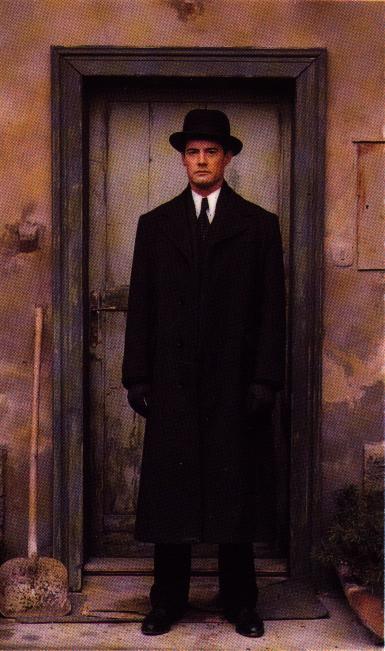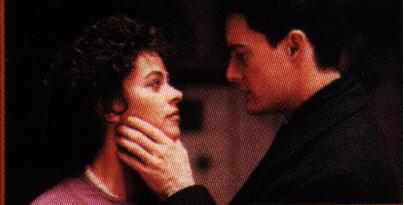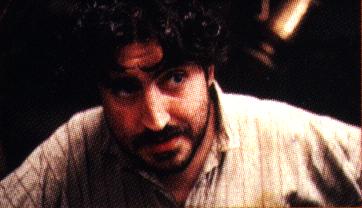The Trial (1993)
 Plot and My Pseudo-Analysis & Review: Again, Josef K. is arrested
for no discernible reason that he can see. The blurb on the box says,
"On the morning of his 30th birthday, Josef K. (Kyle MacLachlan)
wakes up to every person's worst nightmare when two strange men enter his
home to place him under arrest. Bewildered by the reasoning of these
authorities, he doesn't take the charges seriously and attempts to carry
on his life as usual. When summoned to a hearing in an unfamiliar
part of the city, however, K. refuses to accept the case being brought
against him by the system (???). The more K. tries to fight the
unnamed charges and take control of his unravelling life, the more confused
and destructive things become."
Plot and My Pseudo-Analysis & Review: Again, Josef K. is arrested
for no discernible reason that he can see. The blurb on the box says,
"On the morning of his 30th birthday, Josef K. (Kyle MacLachlan)
wakes up to every person's worst nightmare when two strange men enter his
home to place him under arrest. Bewildered by the reasoning of these
authorities, he doesn't take the charges seriously and attempts to carry
on his life as usual. When summoned to a hearing in an unfamiliar
part of the city, however, K. refuses to accept the case being brought
against him by the system (???). The more K. tries to fight the
unnamed charges and take control of his unravelling life, the more confused
and destructive things become."
Actually this movie is technically closer to the
book than the 1963 version, even going so far as to quote sizable portions
of the Muir text, although what else would you expect from the BBC, who
produced it? In fact, in perusing the script (published in the UK
by Faber and Faber), I found the few scenes from the book that were cut
(such as the conversation with Frau Grubach) are in the script and were
actually shot, but cut due to time constraints. The movie was shot
in Prague in wonderfully vivid color, which is a joy to look at.
Besides the few scenes from the book which were dropped, most of the rest
are almost unduly faithful to the book (in the book, for instance, Fräulein
Bürstner has auburn hair, and in the movie she really does
have
auburn hair, Josef trying on gloves before the executioners come, etc.),
which tends to be a plus for people who know the book, although keep in
mind, as Roger Ebert said, that adaptations are not marriages and remakes
are not adultery. I thought this was a very restrained production,
almost like a Classics Illustrated or Masterpiece Theatre
version of Kafka, and very British at that—at least to this very American
reviewer!
Kyle MacLachlan is quite convincing as Josef K.,
although he spends the movie slipping into and out of a pseudo-British
accent, but other than that a very good performance. Anthony Hopkins
steals the entire Cathedral scene with his role as the Priest, although
without the benefit of a pictorial representation the parable of the Man
From the Country is a bit harder to follow than in the 1963 Trial, which
opened with a slide show of the story. On the other hand, people
who don't know the book may have a harder time following it—I have shown
this movie to some people whose whole knowledge of Kafka is nil and some
of them didn't get it. Kafka is kind of an acquired taste.
The main difference between the two filmed Trials,
in my view, is that the newer version doesn't have the kind of mythic resonance
of the earlier one. For instance, when Josef sees the offices in
the '63 Trial, they tower above him and seem to devour him in their
vastness (they were shot in a huge abandoned train station), whereas in
this version they look pretty dumpy and ordinary. Admittedly, in
the book they are stuffy and dumpy, but it is virtually impossible
to capture the paranoia of the book on film except through visuals.
Josef seems more like a mildly annoyed but solid man in this one, as opposed
to the other one, where Perkins's Josef seemed about to careen off the
edge into insanity and paranoia, although of course some of that
is due to his infamous role as Norman Bates the truly disturbed—and
disturbing—mama's boy/weirdo in Psycho (which was,
incidentally, also remade with lesser results). And in Kyle MacLachlan's case,
I seem to remember him as the cool-headed bastion of reason in a malestrom of
insanity as Special Agent Dale Cooper in Twin Peaks. These characterizations
seem to follow them in their respective Trials. In the end, it's basically a
matter of taste as to which you prefer.
Some quotes from the movie:
[After Josef K.'s arrest, he demands to know more about the charges
against him, and confronts the Inspector with his questions.]
Josef K.: I certainly am surprised, but not very surprised.
Inspector: You're not very surprised?
Josef K.: I mean—Can I sit down?
Inspector: It's not usual.
Josef K.: I mean, of course I'm surprised. But after all, the world is
the world, one gets used to surprises, one doesn't take them too seriously, especially
the kind of thing that's going on here today.
Inspector: Oh? Why's that?
Josef K.: I'm not going as far as to say that I look on the whole thing as a
joke—
Inspector: Quite right.
Josef K.: But it's hardly to be taken seriously, is it? I mean, I know I'm
being charged—but with what and on what grounds and who is making the accusation? That
is what I would like to know. This is a legally constituted state, the rule of law
is fully established. Who are you? What is your authority? I demand clear answers
to these questions.
Inspector: You've really got it all wrong. We know nothing about your case.
I don't even know whether you've been charged. You've just been arrested. That's
all we know. But don't worry about us. Worry about yourself. Worry about what might
happen to you. And don't talk so much.
 Leni: The fact is you didn't like me and you probably still don't
like me even now. Do you want to know what my name is?
Leni: The fact is you didn't like me and you probably still don't
like me even now. Do you want to know what my name is?
Josef K.: What is it?
Leni: It's Leni. Call me Leni.
Can't you think of anything else except your trial?
Josef K.: I'm not sure I think about it enough.
Leni: I've heard you're too inflexible.
Josef K.: Who said that?
Leni: Don't be so inflexible. There's
no way you can defend yourself against this court, you have to admit your
guilt, that's all. Make a full confession as soon as you can.
That's the only way you can escape from them. And I'm going to help
you. But you have to say my name first.
Josef K.: Leni.
Leni: Ooh, that's nice.
Josef K.: And if I don't confess my guilt,
then you won't be able to help me?
Leni: No, then I won't be able to help you.
But you don't want my help at all, do you? You're obstinate and you
won't listen to reason. Aren't you? You're obstinate, aren't
you? [She touches his face.] Look, I've got a physical
defect. [Spreading out her fingers.] Feel it.
Josef K. [As he does so.]: Extraordinary.
What a pretty little paw! [He kisses it.]
Leni: You've kissed me! [As they fall on
the floor together.] Now you belong to me!
 Priest: Do you know your case is going badly?
Priest: Do you know your case is going badly?
Josef K.: I have that impression.
Priest: How do you think it will end?
Josef K.: I don't know. Do you?
Priest: No, but I fear it will end badly.
Your case may not get beyond a lower court. You are considered to
be guilty.
Josef K.: But I am not. And anyway,
how can any man be called guilty? We're all human beings, aren't
we? One human being is just like another.
Priest: That's true, but that's how all guilty
men speak.
Josef K.: So you're prejudiced against me
too?
Priest: No, I'm not prejudiced against you.
Josef K.: Thank you. But people are
prejudiced against me. My position is becoming more and more difficult.
Priest: You don't seem to understand the essential
facts. The verdict does not come all at once. The proceedings
gradually merge into the verdict.
Josef K.: So that's how it is.
Priest: What do you plan to do next?
Josef K.: Get more help.
Priest: You ask for too much help from other
people. Especially from women. Don't you see that's not the
kind of help you need?
Josef K.: Oh, I don't know. Women have
great power. And this court is obsessed by women. Show an examining
magistrate an attractive woman in the distance and he'll knock over his
table and the defendant in order to get his hands on her. Are you
angry with me? Perhaps you don't realize the kind of court you're
serving? I'm only telling you what I've observed. I didn't
mean to offend you.
Priest [yelling] : Can't you see what is going to happen
to you? Can't you see what is staring you in the face?
Josef K.: Won't you come down here?
You haven't got to preach a sermon. Can you come down?
Priest: Yes, I can come down now. I
had to speak to you first from a distance—because, you see, I am quite
easily influenced and tend to forget my duty.
Josef K.: Can you spare me a little more time?
Priest: As much as you need.
Josef K.: You're being very kind to me.
I appreciate it. You're an exception among those who belong to the
Court. I trust you more than any of them. I feel I can speak
freely to you.
[Later on]
Josef K.: You were being so kind to me, explaining
things to me, but now you're letting me go as if you cared nothing about me.
Priest: But it was you who said you had to
go.
Josef K.: Yes, you must understand that.
Priest: But you must understand what I am
also.
Josef K.: You're the Prison Chaplain.
Priest: Precisely. That means I belong
to the Court. So why should I want anything from you? The Court
doesn't want anything from you. It recieves you when you come and
it dismisses you when you go.

Directed by:
David Hugh Jones
Written by:
Harold Pinter
based on the novel by Franz Kafka
Starring:
Josef K.
Kyle MacLachlan
The Priest
Anthony Hopkins
Leni
Polly Walker
Doctor Huld
Jason Robards
Fräulein Bürstner
Juliet Stevenson
Frau Grubach
Jean Stapleton
Titorelli
Alfred Molina
Block
Michael Kitchen
Franz
David Thewlis
Willem
Tony Haygarth
Inspector
Douglas Hodge
Rabensteiner
Jirí Schwartz
Kaminer
Ondrej Vetchý
Old Woman
Valérie Kaplanová
Old Man
Jirí Ded
Red Beard
Jirí Vavricek
Deputy Bank Manager
Paul Brooke
K's assistant
Harry Burton
Stairman
Roger Lloyd-Pack
Verger
Oskar Hák
Stairman
Leon Lissek
Washer Woman
Catherine Neilson
Examining Magistrate Trevor Peacock
Small Boy
Václav Jakoubek
Court Usher
Patrick Godfrey
Berthold
Andrew Tiernan
Thin Defendant
Jirí Schmitzer
Flogger
Don Henderson
Clerk
Martin Faltyn
K's Uncle
Robert Lang
Chief Clerk
Jan Laibl
Titorelli's Girl
Lynda Rybova
Titorelli's Girl
Sabina Remundova
Titorelli's Girl
Lucie Bartonova
Titorelli's Girl
Klara Jandova
Titorelli's Girl
Nicolle Gavlasova
Titorelli's Girl
Julie Herrerova
Herr Deimen
John Woodvine
Signor Rossi
Reneiro Compostella
Bookstall Woman
Lena Birková
Executioner
Karel Augusta
Executioner
Petr Drozda
Policeman
Vladimir Tausinger
Man in the Window
Petr Skarke
For more information, visit the Internet
Movie Database.
Some Reviews:
James
Berardinelli's Reel Views
Roger
Ebert
HBO
Reviews
Publiccom
Steve Rhodes
Return to the Movies page.
Back to Leni's Franz Kafka Page.
 Plot and My Pseudo-Analysis & Review: Again, Josef K. is arrested
for no discernible reason that he can see. The blurb on the box says,
"On the morning of his 30th birthday, Josef K. (Kyle MacLachlan)
wakes up to every person's worst nightmare when two strange men enter his
home to place him under arrest. Bewildered by the reasoning of these
authorities, he doesn't take the charges seriously and attempts to carry
on his life as usual. When summoned to a hearing in an unfamiliar
part of the city, however, K. refuses to accept the case being brought
against him by the system (???). The more K. tries to fight the
unnamed charges and take control of his unravelling life, the more confused
and destructive things become."
Plot and My Pseudo-Analysis & Review: Again, Josef K. is arrested
for no discernible reason that he can see. The blurb on the box says,
"On the morning of his 30th birthday, Josef K. (Kyle MacLachlan)
wakes up to every person's worst nightmare when two strange men enter his
home to place him under arrest. Bewildered by the reasoning of these
authorities, he doesn't take the charges seriously and attempts to carry
on his life as usual. When summoned to a hearing in an unfamiliar
part of the city, however, K. refuses to accept the case being brought
against him by the system (???). The more K. tries to fight the
unnamed charges and take control of his unravelling life, the more confused
and destructive things become."
 Leni: The fact is you didn't like me and you probably still don't
like me even now. Do you want to know what my name is?
Leni: The fact is you didn't like me and you probably still don't
like me even now. Do you want to know what my name is?
 Priest: Do you know your case is going badly?
Priest: Do you know your case is going badly?
